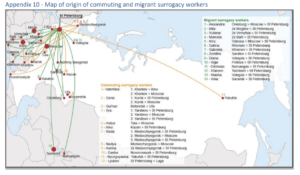[Study updated to 2023]
-
Surrogacy legislation
Russian federal law has allowed surrogacy since 1993 and the first surrogate birth in Russia took place in December 1995[1]. In detail, three pieces of legislation regulate the different aspects of surrogacy[2]: the Family Code (Art. 51 and 52) [3], the 1997 Federal Law on Civil Status Records[4] and the 2011 Federal Law on the Protection of Citizens’ Health (Art. 55) [5]. In addition, Order No. 107н of the Ministry of Health of Russia of 13 August 2012 on the application of medically assisted reproductive technologies, their contra-indications and limitations (Regulation) also contains an article on surrogacy[6].
Russia allows commercial surrogacy only for its nationals and bans it for foreigners. As an example, the 2017 European Court of Human Rights Paradiso ruling concerns an Italian couple who had undergone surrogacy in Russia[7]. The Italian couple had spent more than 50,000 euros to carry out the surrogacy in Russia in 2010[8]. Twelve years later, the law has been amended to restrict child trafficking, organ trafficking and the possibility for LGBT families to obtain a child through surrogacy (see “Updating Russian Surrogacy Law” on page 7 of this document).
None of the above-mentioned texts regulate the economic dimension of surrogacy, which means that no commercial practice is explicitly prohibited. As early as 2012, some authors did not hesitate to describe Russia as a “reproductive paradise“[9] because of its particularly permissive laws on medical assisted reproduction and surrogacy, while others described this legal framework as “neo-liberal” and “opaqueness“[10]. There are many testimonies and examples of Russian surrogacy agencies paying surrogate mothers[11]. The remuneration offered is particularly attractive compared to local wages and is usually a main motivation to become surrogate mother. As other countries with similar light legislation, an industry consisting of more than 150 surrogacy clinics has quickly developed in Russia[12].
However, access conditions to surrogacy in Russia remain ambiguous in at least three aspects: (i) access to surrogacy for unmarried people, (ii) the need to have a genetic link with the child born from surrogacy, and (iii) the possibility for the surrogate mother to keep the child at birth.
- The Family Code and the federal legislation of 1997 only refer to surrogacy for married couples. In contrast, the federal law of 2011 does not limit access to medical assisted reproduction to married couples. In practice, Russian jurisprudence has opened surrogacy to single women (as of 2009[13]) and single men (as of 2011[14]). This will be confirmed by the law of 2022.
- As it stands, the legislation seems to be inconsistent on the need for sponsoring couples to have a genetic link with the child born by surrogacy: while a genetic link is required for married couples, it is not required for single people[15]. Furthermore, Russian law does not require a genetic link to establish parentage for children born through medically assisted reproduction[16].
- Can the surrogate mother withdraw her consent to the surrogacy, and thus keep the child after birth? While the Russian Constitutional Court’s decision No. 880-O of 15 May 2012 seems to reaffirm this principle[17], another Supreme Court decision of April 2017 considerably limits the scope of this right to surrogate mothers[18]. According to paragraph 31 of the latter decision “if the surrogate mother refused to give her consent to the registration by the parents of the above-mentioned persons (potential parents), this circumstance cannot serve as an unconditional basis for refusing to comply with the request of these persons to recognize the child by their parents and to transfer the child to them for the purpose of raising it[19]”. Should it be concluded that the surrogate mother’s mere refusal to register the commissioning couple as parents at birth is not sufficient to nullify her previously given consent to the surrogacy?
-
Surrogacy and women/children traffic
Russia allows commercial surrogacy and surrogate mothers are usually paid. Russian law does not regulate the amount of remuneration of surrogate mothers, there is neither a legal minimum nor a legal maximum. Surrogate mothers are recruited through online advertising campaigns[20] and newspaper advertisements[21], among other things, and their salaries are well above the average annual salary of a woman[22].
Ms Christina Corinna Weiss’ 2017 PhD thesis focuses on the status of surrogacy in Russia[23] and provides extensive information on surrogacy in Russia. In particular, she conducted interviews with 33 surrogate mothers in Russia[24]. The map below shows the origin of surrogate mothers.

Of the surrogate mothers interviewed, 26 (out of 33) had to leave their home town to go to the city where the clinic is located, usually St Petersburg. 14 (out of 33) surrogate mothers left not only their home town but also their home country to go to Russia, which Ms Christina Corinna Weiss described as “migrant surrogacy workers“. In interviews, it appears that money is the main and initial motivation for all 33 surrogate mothers, even if other motives may have been added during the surrogacy process[25].
These interviews also show that surrogacy contracts impose numerous constraints on surrogate mothers, such as abstinence from harmful substances (alcohol, drugs, etc.), abstinence from sexual intercourse during all the surrogacy process, a travelling ban, a driving ban or even a ban of using public transport. Contracts usually also include a specific diet, as well as sports requirements and obligations to answer phone calls[26].
The surrogate mother is exposed to financial penalties in the event of non-compliance with these contractual commitments, ranging from 10% of the amount of the surrogacy per breach to the entire amount of the surrogacy in other cases[27].
-
Surrogacy and political currents
While some observers felt in 2017[28] and 2019[29] that surrogacy raised little public debate in Russia, several bills to expand or restrict surrogacy have been introduced in the Russian parliament, the Duma. In 2016, a pro-surrogacy bill was introduced in the Duma to remove provisions allowing the surrogate mother to keep the child after birth[30]. Conversely, a year later in 2017, another bill to abolish all forms of surrogacy was introduced in Russia but postponed until now[31].
The situation has significantly changed since 2020 following the coronavirus health crisis. With the closure of the borders, up to 1,000 babies born of surrogacy were reportedly stranded in Russia[32]. Some babies have been placed in orphanages while waiting for foreign couples to come and collect them, as in St Petersburg where around thirty babies born of surrogacy have been waiting for the arrival of the Chinese sponsor couples in an orphanage[33].
Other children were simply looked after by nannies in flats rented for the occasion by the clinics. The quality of care provided seems to have been variable and several babies born to surrogacy were found dead by the local authorities in January[34] and October 2020[35]. The Russian authorities have since opened criminal proceedings against the clinics and doctors involved in these cases[36].
In this context, a new bill was tabled in the Duma in May 2021[37] to ban surrogacy for foreigners, to give Russian citizenship to all children born of surrogacy to facilitate controls by the Russian authorities and to limit surrogacy to married couples and single women in cases of infertility[38]. The explanatory memorandum of the latter bill explicitly refers to the scandals related to surrogacy in Russia, especially during the year 2020[39].
The deputy speaker of the duma, Irina Yarovaya, recently stated that “Russia must not become a child factory for foreigners[40]“. The text received the support of the patriarch of the Russian orthodox church Cyril who recalled that surrogacy “destroys the family unit and becomes a form of exploitation of women in need[41]“. As well as Anna Kuznetsova, the high representative of the president of the Russian federation for children’s rights[42].
On the other hand Oksana Puchkariova, the deputy of the committee in charge of family, women’s and children’s issues, responsible for the analysis of this bill, formally opposed this text which, according to her, limits the constitutional rights of “couples, including those who are not married, as well as single men who wish to become fathers using a surrogate mother[43]“.
The text will be debated from October 2021, after the parliamentary elections scheduled for 18 September 2021.
-
Russian surrogacy law updated
The above-mentioned bill (Federal Law No. 538-FZ of 19 December 2022 “On Amendments to Certain Legislative Acts of the Russian Federation”) was therefore passed in second and third reading by the lower house of the Russian Parliament and signed by Vladimir Putin on 19 December 2022. The amendments were then incorporated into the Family Code of the Russian Federation.
This law prohibits foreigners from using a Russian surrogate for surrogacy. It restricts the use of a surrogate mother to married couples where one of the spouses is a Russian citizen, but opens up the possibility to single Russian women, in all cases where a person is unable to have a child for medical reasons. Couples must be married in order to be designated as the child’s parents, and the marriage cannot be entered into for the sole purpose of concluding an surrogacy contract. The law also recognises in fact Russian citizenship for any child born in the country.
While this law was enacted with the aim of limiting the trafficking of children and organs from Russia and curbing “reproductive tourism”, it also has its origins in a national battle against so-called “non-traditional” families, as LGBTQIA+ families. As early as 2013, the Russian parliament passed an initial law banning “homosexual propaganda”, which was supplemented and strengthened in October 2022.
This law is also part of a nationalist policy to combat an ageing population. Russian women have an average of 1.58 children, which is not enough to renew the generations, and helping foreigners to have children is not a government priority.
[1] Translation done by Ms Christina Corinna Weiss in appendix §4.2.1 – P. 124 https://dora.dmu.ac.uk/bitstream/handle/2086/15036/PhD%20Thesis.%20Weis.%20Reproductive%20Migrations.%20Final%20Version.Dec%202017.pdf?sequence=1&isAllowed=y
[2] P.8 https://www.dropbox.com/s/5o40zhqncyznono/INF%282016%294%20Addendum%20f.pdf?dl=0 et §73 et §74 de l’arrêt CEDH Paradiso (URL : https://hudoc.echr.coe.int/eng/#{%22itemid%22:[%22001-170867%22]} )
[3] Translation done by Ms Christina Corinna Weiss in appendix 7.3.2 URL : https://dora.dmu.ac.uk/bitstream/handle/2086/15036/PhD%20Thesis.%20Weis.%20Reproductive%20Migrations.%20Final%20Version.Dec%202017.pdf?sequence=1&isAllowed=y
[4] https://www.surrogacyfrance.com/gpa-en-russie.php
[5] Translation done by Ms Christina Corinna Weiss in appendix 7.2.2 URL : https://dora.dmu.ac.uk/bitstream/handle/2086/15036/PhD%20Thesis.%20Weis.%20Reproductive%20Migrations.%20Final%20Version.Dec%202017.pdf?sequence=1&isAllowed=y ; version origanale : http://www.rg.ru/2011/11/23/zdorovie-dok.html (accessed 09/10/2015)
[6] Translation done by Ms Christina Corinna Weiss in appendix 7.2.1 URL : https://dora.dmu.ac.uk/bitstream/handle/2086/15036/PhD%20Thesis.%20Weis.%20Reproductive%20Migrations.%20Final%20Version.Dec%202017.pdf?sequence=1&isAllowed=y
[7] https://hudoc.echr.coe.int/eng/#{%22itemid%22:[%22001-170867%22]}
[8] §44 https://hudoc.echr.coe.int/eng/#{%22itemid%22:[%22001-170867%22]}
[9] https://www.bionews.org.uk/page_155330 et https://www.omicsonline.org/scientific-reports/2155-9627-SR207.pdf
[10] Ms Christina Corinna Weiss PHD, p.146 et 147 https://dora.dmu.ac.uk/bitstream/handle/2086/15036/PhD%20Thesis.%20Weis.%20Reproductive%20Migrations.%20Final%20Version.Dec%202017.pdf?sequence=1&isAllowed=y
[11] https://www.dropbox.com/s/5o40zhqncyznono/INF%282016%294%20Addendum%20f.pdf?dl=0 et https://theconversation.com/la-russie-ce-pays-ou-la-gestation-pour-autrui-est-legitime-72383
[12] https://www.lecourrierderussie.com/2020/06/les-bebes-confines-de-la-Surrogacy/
[13] https://theconversation.com/la-russie-ce-pays-ou-la-gestation-pour-autrui-est-legitime-72383
[14] https://www.lecourrierderussie.com/2019/09/la-Surrogacy-en-toute-liberte/
[15] https://www.dropbox.com/s/5o40zhqncyznono/INF%282016%294%20Addendum%20f.pdf?dl=0
[16] https://www.dropbox.com/s/5o40zhqncyznono/INF%282016%294%20Addendum%20f.pdf?dl=0
[17] https://www.dropbox.com/s/5o40zhqncyznono/INF%282016%294%20Addendum%20f.pdf?dl=0
[18] https://www.lecourrierderussie.com/2020/06/les-bebes-confines-de-la-Surrogacy/ et lien du journal officiel du gouvernement russe sur cet arrêt :
[19] §31 (traduction Microsoft Edge) https://rg.ru/2017/05/24/detiproishozhd-dok.html
[20] Ms Christina Corinna Weiss PHD https://dora.dmu.ac.uk/bitstream/handle/2086/15036/PhD%20Thesis.%20Weis.%20Reproductive%20Migrations.%20Final%20Version.Dec%202017.pdf?sequence=1&isAllowed=y
[21] Ms Christina Corinna Weiss PHD, Appendix 9.1 https://dora.dmu.ac.uk/bitstream/handle/2086/15036/PhD%20Thesis.%20Weis.%20Reproductive%20Migrations.%20Final%20Version.Dec%202017.pdf?sequence=1&isAllowed=y
[22] Ms Christina Corinna Weiss PHD, P.179 https://dora.dmu.ac.uk/bitstream/handle/2086/15036/PhD%20Thesis.%20Weis.%20Reproductive%20Migrations.%20Final%20Version.Dec%202017.pdf?sequence=1&isAllowed=y
[23] Ms Christina Corinna Weiss PHD, Appendix 9.2 https://dora.dmu.ac.uk/bitstream/handle/2086/15036/PhD%20Thesis.%20Weis.%20Reproductive%20Migrations.%20Final%20Version.Dec%202017.pdf?sequence=1&isAllowed=y
[24] Ms Christina Corinna Weiss PHD, Table 1, p.394 https://dora.dmu.ac.uk/bitstream/handle/2086/15036/PhD%20Thesis.%20Weis.%20Reproductive%20Migrations.%20Final%20Version.Dec%202017.pdf?sequence=1&isAllowed=y
[25] Ms Christina Corinna Weiss PHD, P.180 https://dora.dmu.ac.uk/bitstream/handle/2086/15036/PhD%20Thesis.%20Weis.%20Reproductive%20Migrations.%20Final%20Version.Dec%202017.pdf?sequence=1&isAllowed=y
[26] Ms Christina Corinna Weiss PHD, P. 139 https://dora.dmu.ac.uk/bitstream/handle/2086/15036/PhD%20Thesis.%20Weis.%20Reproductive%20Migrations.%20Final%20Version.Dec%202017.pdf?sequence=1&isAllowed=y
[27] Ms Christina Corinna Weiss PHD, Note 58, p.139 https://dora.dmu.ac.uk/bitstream/handle/2086/15036/PhD%20Thesis.%20Weis.%20Reproductive%20Migrations.%20Final%20Version.Dec%202017.pdf?sequence=1&isAllowed=y
[28] Voir l’opinion concordante du juge Dedov à l’arrêt CEDH Paradiso (URL : https://hudoc.echr.coe.int/eng/#{%22itemid%22:[%22001-170867%22]} )
[29] P.57 https://www.dropbox.com/s/5o40zhqncyznono/INF%282016%294%20Addendum%20f.pdf?dl=0
[30] https://theconversation.com/la-russie-ce-pays-ou-la-gestation-pour-autrui-est-legitime-72383
[31] https://theconversation.com/la-russie-ce-pays-ou-la-gestation-pour-autrui-est-legitime-72383
[32] https://www.theguardian.com/lifeandstyle/2020/jul/29/up-to-1000-babies-born-to-surrogate-mothers-stranded-in-russia et https://www.lecourrierderussie.com/2020/06/les-bebes-confines-de-la-Surrogacy/
[33] https://www.lepoint.fr/monde/bebes-bloques-en-russie-les-autorites-envisagent-un-vol-humanitaire-22-09-2020-2393150_24.php
[34] “It was opened after the discovery of a body of a newborn boy in one of the apartments in the Vniissok locality (…) According to preliminary data, a boy born by a surrogate mother in December of 2019 was under the nanny’s care in the apartment where three more infants” https://tass.com/emergencies/1180171 et http://www.rapsinews.com/judicial_news/20201209/306577379.html
[35] « it was established that on 08.10.2020, the corpse of Ch., born on 30.04.2020, was found in a flat in the city of Kommunar, Leningrad region, without signs of violent death. The child was born by the surrogate mother of A. of citizens of the People’s Republic of China » (traduction Microsoft Edge), URL : https://sozd.duma.gov.ru/bill/1191971-7#bh_note
[36] https://www.lecourrierderussie.com/2020/06/les-bebes-confines-de-la-Surrogacy/ et https://www.telegraph.co.uk/news/2020/07/17/russian-investigators-pursue-human-trafficking-charges-surrogate/
[37] https://www.economist.com/europe/2021/03/18/russias-liberal-surrogacy-rules-are-under-threat
[38] Note explicative, page 7 https://sozd.duma.gov.ru/bill/1191971-7#bh_note
[39] https://sozd.duma.gov.ru/bill/1191971-7#bh_note
[40] https://www.lecourrierderussie.com/2020/08/Surrogacy-la-russie-prete-a-rouvrir-le-debat/
[41] https://rg.ru/2021/05/18/patriarh-kirill-prizval-zapretit-surrogatnoe-materinstvo-dlia-inostrancev.html
[42] https://iz.ru/1157496/2021-04-27/kuznetcova-nazvala-surrogatnoe-materinstvo-dlia-inostrantcev-bezobraziem
